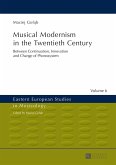With this study the author «opened up a previously locked door of Beethoven research» (Martin Geck). The book presents conclusive answers to questions that had occupied critics for more than a century. It makes clear what exactly Beethoven and his contemporaries meant by the term «heroic». It proves that the «heroic-allegorical ballet» The Creatures of Prometheus is a key work for an understanding of the Eroica, and shows that Beethoven associated the First Consul of the French Republic, Napoleon Bonaparte, with the mythical figure of the Titan Prometheus. The book draws on interdisciplinary researches in the areas of Greek Mythology, Napoleonic History and Comparative Literature.
About the German edition of this book:
«Floros' work has shown that the links between the ballet and the symphony are more substantial than has usually been assumed.» (William Kinderman, 1997)
«Floros' monograph presents an innovative synthesis. It has had a great impact on Eroica criticism, and has sparked a trend in interpreting Beethoven's political views.» (Thomas Sipe, 1998)
«Floros' work has shown that the links between the ballet and the symphony are more substantial than has usually been assumed.» (William Kinderman, 1997)
«Floros' monograph presents an innovative synthesis. It has had a great impact on Eroica criticism, and has sparked a trend in interpreting Beethoven's political views.» (Thomas Sipe, 1998)







